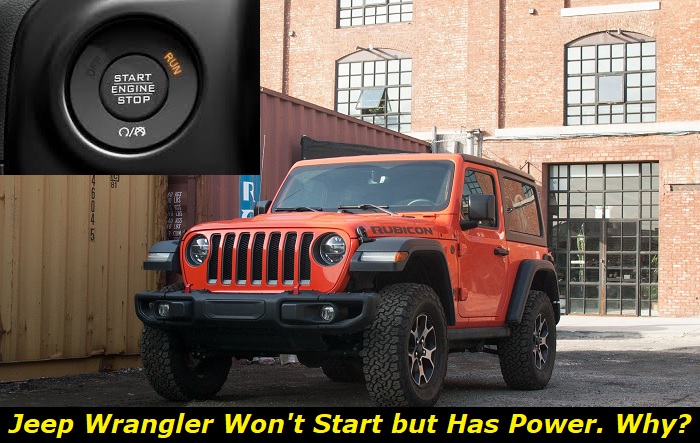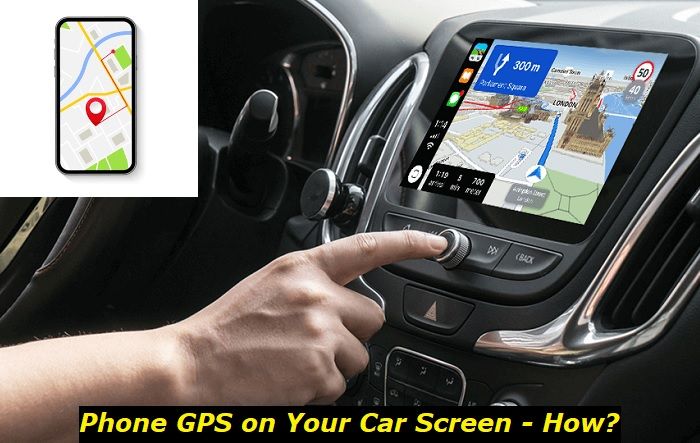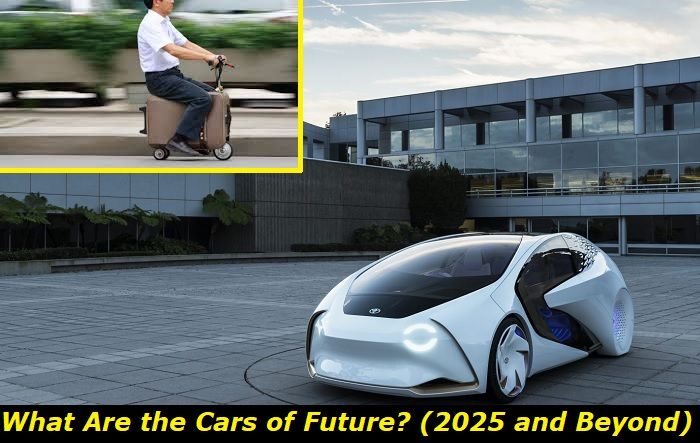The Jeep Wrangler is a popular off-road vehicle that is known for its durability and reliability, especially in extreme terrain and driving conditions. However, as most car owners know, even the most reliable vehicle runs into problems now and then. One issue that Jeep Wrangler owners might run into is that their car won't start even though it has power. What causes this problem, and how can you deal with it?
No-start problems highlights
- Level of urgency:High
- Can you drive?Obviously, no
- DIY inspection:Possible but complicated
- DIY repair:Mostly,impossible
- Price for repair:$250 - $850
- Common Reasons:Fuel or air supply, compression, spark, electronics
- Ways to fix:Check each system that may cause no-start, check electronics

Why Isn't Your Jeep Wrangler Starting Even Though it has Power?
If your Wrangler isn't starting, but the lights and other systems are powering on, you might feel like panicking for a moment. Don't worry, your engine is probably fine. Before you dial up a mechanic to check your car, there are some things you can check yourself first.
Here are some parts of your car that you should check if your Jeep Wrangler won't start despite having power.
1) Check the Battery
The first thing you should check when your Jeep Wrangler won't start is the battery. This might sound a little hard to believe. After all, the car still has power. Perhaps the lights, radio, and other electronic systems are still running. The thing is, these systems require a lot less electricity to run than your car needs to start. This means that your battery can be weak or dying, and still power these systems while failing to start your car.
You can check your battery voltage with a multimeter. If the voltage is lower than the normal level, then the battery could be dead or dying. A low voltage reading can also indicate a problem with the charging system. In this case, the alternator may need to be replaced.
If the battery is older than 2-3 years, it might be too old and need to be replaced.
2) Check the Battery Terminals for Corrosion
You should also check the battery connections. Electricity flows through the terminals to reach the electronics in the rest of the car. If the connections are loose or dirty, this can result in a loss of power or voltage. This could result in the electrical systems receiving enough power to run while the starter motor does not.
Make sure the terminals are clean and tight. If the terminals are dirty or corroded, you can clean them using a solution of water and baking soda, and a wire brush.
By the way, battery issues may also trigger the auto start-stop warning light in the Wrangler. Read more about this in our recent article.
3) Transmission Temperature is too High
Many Jeep Wrangler owners have complained that they have trouble starting their cars again after stopping the engine. The common complaint is that their car won't start up again after they have filled up at a gas station. In this situation, the most likely culprit is the transmission temperature switch.
This means that the transmission is currently running above the temperature that Jeep has deemed safe. To protect the transmission, the car will not start until the transmission has cooled down. When this happens, the only thing to do is to allow your car to cool down for a while until the transmission is at a safe temperature again.
Once the engine has cooled down a little, you will need to check the level of your transmission fluid. High transmission temperature is a symptom of low transmission fluid. Continuing to drive your car with low transmission fluid can cause damage to the transmission, so make sure to top up your fluid level if it is too low.
If the transmission fluid is already at a suitable level, then you might have a problem with your transmission temperature sensor. In this case, you will need the sensor examined and replaced if it is faulty.
4) Starter Motor
If the battery and connections are fine, then the next part to check is the starter motor. When you turn the key, the starter motor engages the flywheel to crank the engine and start the car. If the starter motor fails, the engine won't start, even if there is power.
Some signs that you might have a bad starter are that the engine doesn't crank at all, and the starter makes a clicking noise when you turn the ignition.
If the starter motor is failing, it will need to be replaced before the engine can start again.
5) Fuel System
Another common cause of a Jeep Wrangler not starting is a problem with the fuel system. If the engine doesn't receive enough fuel, it won't start.
Check the fuel gauge to ensure the tank has enough fuel. If the gauge reads low, add fuel and try starting the engine again. Check the fuel gauge to ensure that there is enough fuel in the tank.
If the tank is full, you should also check the fuel pump and fuel filter. A failing or clogged fuel pump will prevent the correct amount of fuel from reaching the engine. Similarly, a clogged fuel filter will greatly reduce the fuel pressure in the system. Both conditions will prevent the engine from starting even though the car has power.
If you're dealing with a faulty fuel pump or a blocked fuel filter, you will need to replace the bad part to get fuel back into the engine.
6) Ignition System
The ignition system is responsible for creating the spark that ignites the fuel and starts the combustion that powers the engine. If there is a problem with the ignition system, combustion won't occur, and the engine won't start.
Check the spark plugs to see if they are worn or damaged. If they are worn, replace them.
You should also check whether they have been fouled with carbon deposits. Fouled sparkplugs can be cleaned easily with sparkplug cleaning solution and a wire brush.
You should also check the ignition coils. If the ignition coils have failed, the sparkplugs won't fire. You will need to replace them if this is the case.
7) Worn Key or Bad Ignition Switch
When you turn your key in the ignition, it sends a signal from the ignition switch to activate the starter motor. If the key is worn, it might not turn the ignition, preventing the ignition switch from working. If the key no longer starts the car, then you will need to get a new one.
If the ignition switch is bad, then it won't send a signal to turn on the starter motor, and the car won't start. A bad ignition switch will need to be replaced.
How to Prevent This from Happening to Your Jeep Wrangler Again
While it isn't possible to guard against every cause of this problem, there are some steps you can take to make sure that you don't run into this issue again.
Here are some steps you can take to prevent your Jeep Wrangler from not starting.
1) Keep Transmission Fluid Filled
When the level of transmission fluid in the transmission system is too low, it can cause overheating in the system, along with reduced performance and mechanical damage. Making sure that the transmission fluid is always at a suitable level will prevent the transmission temperature switch from activating and disabling the engine.
2) Take Care of Your Battery
A weak battery is a common cause of this problem. To prevent this from happening, make sure to take good care of your battery to prolong its lifespan and ensure that it is always well-charged.
You can keep your car battery in good health by doing the following:
- Avoid driving on short trips too often.
- Avoid leaving your battery unused in the car for long periods.
- Protect the battery from temperature extremes.
3) Replace the Fuel Filter
A bad fuel filter can cause serious problems in the rest of the fuel system. If the filter is blocked, fuel won't get to the rest of the system. If there is a hole in the filter, then the fuel pump could get damaged. Make sure to check your filter regularly and replace it with a fresh one if necessary.
Conclusion
When your Jeep Wrangler won't start despite having power, it can be a very frustrating experience. Fortunately, this is a relatively common problem with the Wrangler and is not a cause for alarm. There are several reasons why this could happen.
The most common reasons are that the battery is weak, or there is a problem with the fuel pump or fuel filter. It could also be caused by problems with the ignition system, the key, or the ignition switch.
Checking the battery voltage and connections, fuel pump, fuel filter, spark plugs, and ignition coils are all important steps to take before seeking professional help. By knowing which parts of your car to check first, you can avoid unnecessary repairs and get your car back on the road in no time.
About the authors
The CarAraC research team is composed of seasoned auto mechanics and automotive industry professionals, including individuals with advanced degrees and certifications in their field. Our team members boast prestigious credentials, reflecting their extensive knowledge and skills. These qualifications include: IMI: Institute of the Motor Industry, ASE-Certified Master Automobile Technicians; Coventry University, Graduate of MA in Automotive Journalism; Politecnico di Torino, Italy, MS Automotive Engineering; Ss. Cyril and Methodius University in Skopje, Mechanical University in Skopje; TOC Automotive College; DHA Suffa University, Department of Mechanical Engineering






Add comment